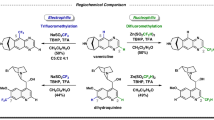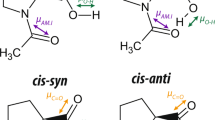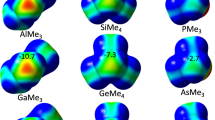Abstract
THE recent statement by Kreevoy and Eyring1, based on theoretical considerations, that the hyperconjugation energy is approximately proportional to the number of α-hydrogen atoms, is supported by an empirical relation discovered independently during the course of other work. This shows that not only α-hydrogen atoms but also hydrogen atoms attached to β, γ and δ carbon atoms influence the hyperconjugation energy of olefines.
This is a preview of subscription content, access via your institution
Access options
Subscribe to this journal
Receive 51 print issues and online access
$199.00 per year
only $3.90 per issue
Buy this article
- Purchase on Springer Link
- Instant access to full article PDF
Prices may be subject to local taxes which are calculated during checkout
Similar content being viewed by others
References
Kreevoy, M. M., and Eyring, H., J. Amer. Chem. Soc., 79, 5121 (1957).
Conant, J. B., and Kistiakowsky, G. B., Chem. Rev., 20, 181 (1937).
Author information
Authors and Affiliations
Rights and permissions
About this article
Cite this article
BEECH, S. Hyperconjugation due to Hydrogen Atoms in β γ and δ Positions. Nature 181, 1617–1618 (1958). https://doi.org/10.1038/1811617a0
Issue Date:
DOI: https://doi.org/10.1038/1811617a0
Comments
By submitting a comment you agree to abide by our Terms and Community Guidelines. If you find something abusive or that does not comply with our terms or guidelines please flag it as inappropriate.



